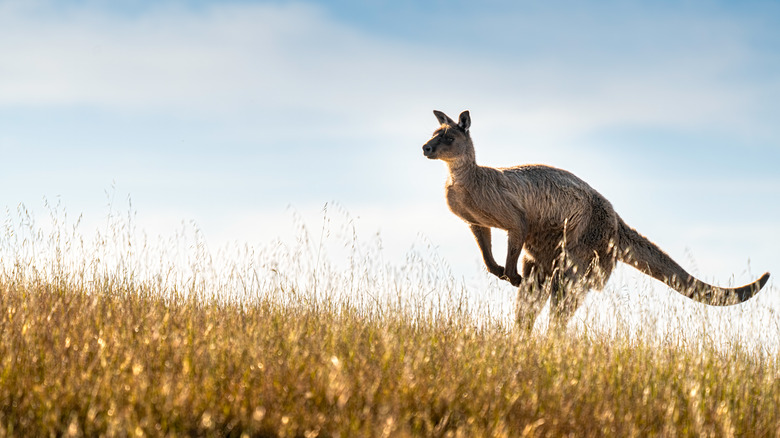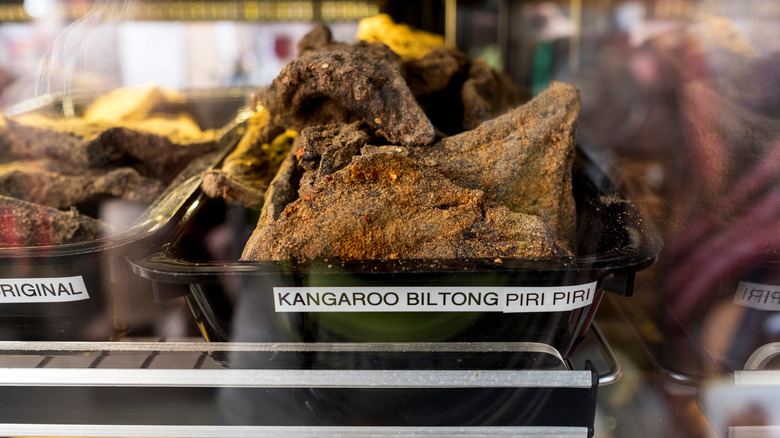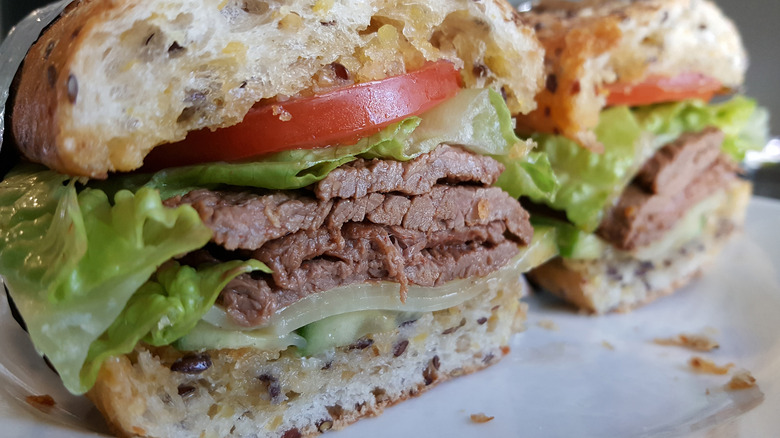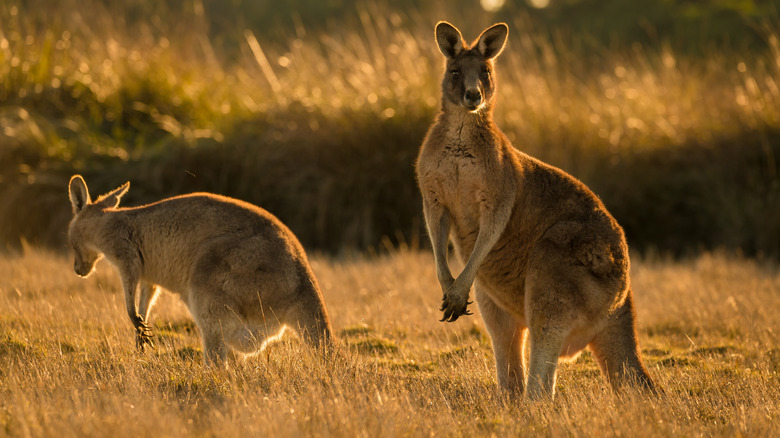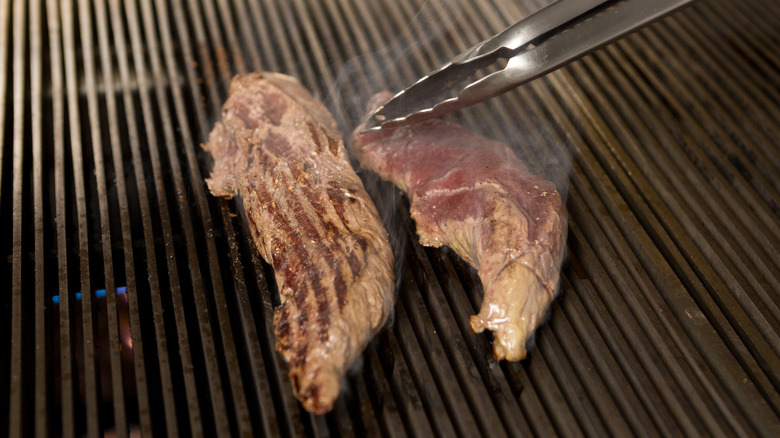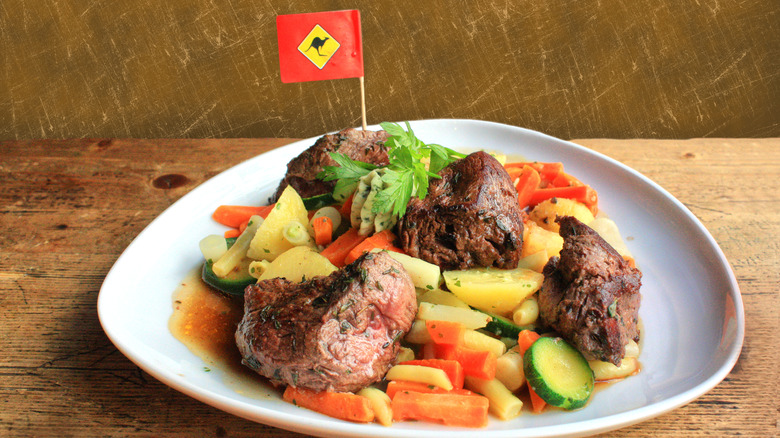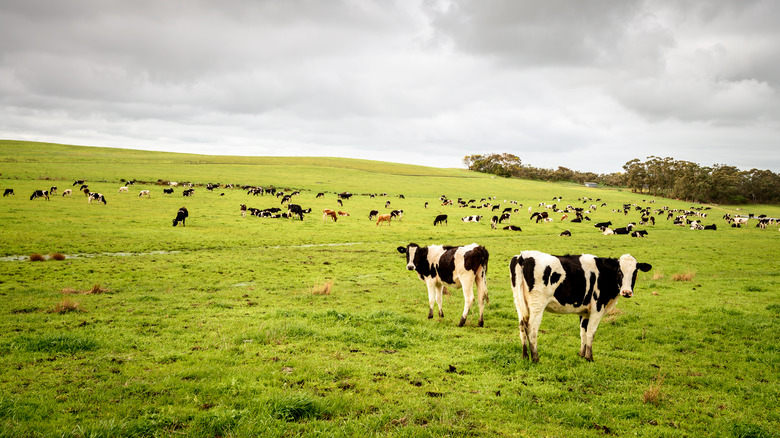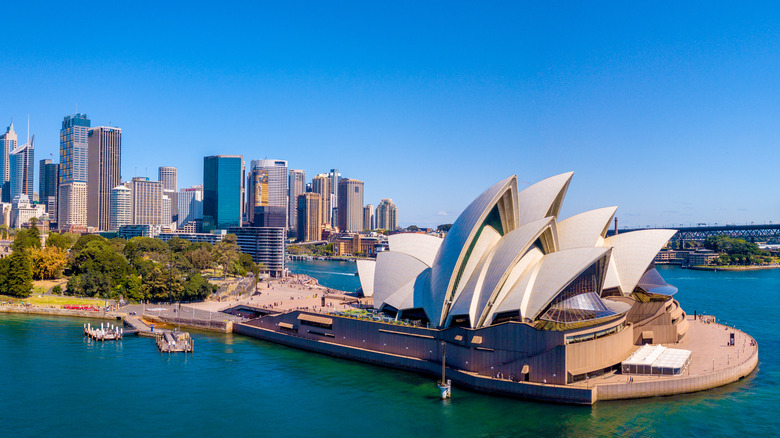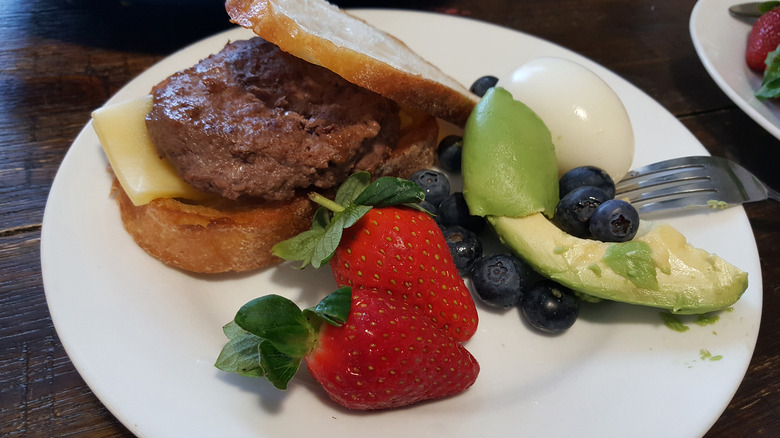The Truth About Australia's Kangatarian Diet
Australians, otherwise known as Aussies, are synonymous with doing hog-wild things to the English language. In their vernacular slang, doing a U-turn is "chucking a U-ie," eating breakfast is "having some brekkie," and going to the liquor store is "heading to the bottle-o." They even have words for items that they invented. Take for instance fairy bread, which is white bread that's been covered in butter and sprinkles.
However, some Aussie words are more mysterious than others. A great example of this is the term "kangatarian." That's right, kangatarian, it's a real word. But hold on, what exactly is a kangatarian? Moreover, what's the history of this term? Well, if you're curious to discover the answer to these questions, and find out a whack more facts about kangatarianism along the way, then you've come to the right place. Join us as we do a deep dive into the entomology of this word and how it's being used in modern Australia.
The kangatarian diet consists of kangaroo plus non-meat products
Vegans don't eat any animal products, vegetarians don't eat any meat, and pescatarians won't eat any meat that hasn't come out of a body of water. According to the ABC, kangatarianism is just another type of diet someone can do. However, unlike pescatarians, the only meat kangatarians will consume is kangaroo. Yup, these folks consume those big, jumping marsupials that are native to the Australian outback.
Now, if you haven't been to Australia, you might be shocked to find out that its residents do in fact eat kangaroo meat. If you are shocked, you might be even more surprised to learn that it's a rather common activity. You can purchase kangaroo meat from restaurants, butchers, and major supermarkets. Kangaroo steaks and kangaroo sausages are just run-of-the-mill foods that you can have. The aforementioned ABC piece even references that you can even make kangaroo stew.
Some people are kangatarians for ethical reasons
Alright, so now we all know what exactly kangatarianism is. However, merely knowing the term doesn't explain why anyone would be compelled to partake in this diet. Which brings us to an article by the Brisbane Times, which explains that some people are kangatarians because eating kangaroos is better for the Australian environment than eating introduced species such as cows. This is because no land or pastures need to be cleared for Australia's native marsupials.
Moreover, Australian kangaroos are treated better than some of the country's domesticated animals. As Samantha Vine, a kangatarian, said to the Brisbane Times, "It's not worth the pleasure of eating meat if it hasn't been treated well. I don't want to be part of that." Peter Ampt, a University of Sydney lecturer that discusses natural resource management, told the publication, "The animals dies instantly, without the knowledge of what's going to happen, and there are no drugs used in its production."
Kangaroos don't need to be farmed
Now, if all of this info makes you curious to go and visit a kangaroo farm, then you're out of luck. This is because, as Suitable Table writes, kangaroos aren't farmed in a traditional manner. Instead, all kangaroos that are killed for their meat come from wild populations.
The fact that kangaroos aren't farmed like cows, pigs, and sheep are attracts some people to the kangatarian lifestyle. Take, for instance, "Love Island Australia's" Justin Lacko, who expressed that he once believed that kangatarianism was the diet for him (via The Sydney Morning Herald). In an episode of the show, Lacko said, "I used to be kangatarian ... I used to only eat kangaroo and fish. Because kangaroos aren't farmed."
Moreover, Lacko isn't the only person who believes that the fact that kangaroos don't live on farms is a good reason to become a kangatarian. According to Peter Ampt, a supporter of eating kangaroo meat who spoke with the Telegraph, this point helped sway some folks into taking up this dietary program. He said, "They have sought it out as a meat that is ethically produced in the sense that kangaroos aren't battery farmed or penned up like pigs in small sties or industrially farmed."
Kangaroo is an quick and easy meat to cook
Because Kangaroo is a type of meat not many people have cooked, some might wonder if it needs to be prepped in any special way. Fortunately for kangatarians, it's actually quite simple to cook. In an article from The Guardian, they write that kangaroo meat can be roasted, barbecued, stir-fried, or even slow-cooked. It's a very versatile ingredient, and it isn't any more complex than any other meat one can get from their grocery store.
Nevertheless, just because kangaroo's an easy meat to cook up, it doesn't mean that you can be complacent while doing so. As Colin Fassnidge, the head chef of the Sydney-based restaurant Four in Hand and 4Fourteen, told The Guardian, "With kangaroo it depends on the thickness. If it's as big as your hand, it needs around two minutes on each side. Barbecuing is a good way to cook kangaroo or wallaby, but you want to have everything ready before you start — you can't afford to go wandering off looking for your tongs or it will overcook."
Kangaroo meat is nutritious
Not only aren't kangaroos farmed, but their meat can actually be good for you, a dietitian named Dr. Kate Marsh told the Sydney Morning Herald. She said, "Nutritionally, kangaroo is very lean and is still a good source of protein." Dr. Marsh also noted that the kangaroos are a superior source of iron compared to other types of red meats.
Furthermore, Dr. Marsh isn't the only dietitian to tout the benefits of eating kangaroo. Another dietitian named Alison Patterson explained to the publication Coach how great having this meat can be. She said that it's "lean, high in protein, and rich in essential minerals such as iron and zinc," and that "it's a great choice of red meat to add to your plate."
Patterson's reasons for loving kangaroo meat don't stop there. She told Coach some other benefits of having this produce, saying, "Kangaroo meat also contains the omega-3 fatty acids DHA and EPA — traditionally we think of these nutrients being found in fish, but kangaroo is also a good option for adding more of these important nutrients to your diet."
The word 'kangatarian' started out as a bit of a joke
There's no getting around it, "kangatarian" is a very silly word. It's as if the Aussies slapped the first half of the word "kangaroo" onto the suffix "tarian" and were like, "Yeah mate, sorted that one out, aye." It seems like a word that is making fun of vegetarians and pescatarians, rather than being one that describes a real, legitimate diet.
Peter Ampt expressed to the Telegraph that the people who coined the term "kangatarian" knew it was sort of funny. Ampt claimed to be around at the beginning of the movement, stating it began with a group of vegetarians who didn't want to support the farming industrial complex but wanted to eat organically-produced red meat. He said, "They started eating kangaroo and loved it, then they coined the phrase 'kangatarians,' it was a bit of a joke initially." So, there you have it, that's where the slightly ridiculous word "kangatarian" comes from. Moreover, it's probably alright to have a giggle at this term. Because if the people who came with the word thought it was funny, then you could most likely laugh at it too.
Some vegans and vegetarians oppose the kangatarian lifestyle
Like all diets, kangatarianism has received its share of staunch opposition. Take for instance, a proposed U.S. law titled the Kangaroo Protection Act of 2021. This law was sponsored by Democrat Salud Carbajal and puts forth the notion that red kangaroos, eastern grey kangaroos, western grey kangaroos, and common wallaroo kangaroos shouldn't be eaten inside the borders of America.
According to the publication Al Día, Carbajal believes that using kangaroo products is an activity that shouldn't be supported at all by the U.S. He said, "While California has banned the sale of kangaroo products, enforcement of this inhumane practice is lacking." Carbajal also stated, "I'm proud to stand against kangaroo trafficking and have introduced the Kangaroo Protection Act to make it illegal to exploit kangaroos in the United States and impose penalties for violations." This proposed bill was received bipartisan support and was backed by a Republican representative, Brian Fitzpatrick (pictured).
Kangaroos produce less methane than cows
In 2011, the Sydney Morning Herald reported that scientists had disproved the myth that kangaroos don't produce any methane. According to the publication, it was commonly believed that these marsupials had special gut bacteria in them that resulted in this species producing no greenhouse gases, or at least a remarkably tiny amount of them. However, researchers from the University of Wollongong, the University of New South Wales, and the University of Zurich discovered that kangaroos produce more of these gases than previously believed. In fact, they can make 3 liters' worth of methane each day, depending on their diet.
However, while this is the case, the researchers also emphasized that kangaroos produce a lot less methane than dairy cows. They stated that a single dairy cow can let loose up to 200 liters of greenhouse gases each day. This means that for every 1 liter of methane from a kangaroo, a dairy cow can make around 66. One of the researchers, Adam Munn, also said that kangaroos eat and drink less than dairy cows do, which reduces their environmental footprint.
The kangatarian diet still isn't mainstream in Australia
Despite the fact that the word "kangatarian" has been around since 2010, it still isn't a mainstream diet in Australia. This can be demonstrated in the fact that the Australian media has to keep explaining this term to its audience. Take for instance the very popular Aussie pop culture site Punkee, which had to explain to its teenage and young adult demographic what the term "kangatarian" meant in 2018. Punkee did this because when Justin Lacko called himself an ex-kangatarian on "Love Island Australia," it confused many an Aussie on Twitter.
Furthermore, there are no big open Facebook groups that are focused on the kangatarian diet. In 2020, the hashtag kangatarian was only used six different times on Twitter. These facts indicate that while kangatarianism is a term some people know of, it's still yet to be adopted by mainstream society.
Becoming a kangatarian is a form of ethical bargaining
In the essay "To Eat or Not to Eat Kangaroo," Dr. Nancy Cushing outlined some ways people have tried to reduce the amount of harm they personally cause the environment while still eating meat. Some people try to eat less red meat, while others only eat the meat which comes from chickens or fish. Some people eat roadkill while others only eat the meat of insects and bugs. Some people, however, choose to only eat meat if it comes from kangaroos.
Cushing classified these sorts of diets as "ethical bargaining." They are forms of trying to be a more environmentally conscious human without giving up your desire to eat other animals. In this essay, Cushing stated that there are enough logical reasons for why eating kangaroo meat is less harmful than eating farmed animals that some people would find becoming a kangatarian compelling. However, the author also asserted that others wouldn't want to take up this diet because they don't like the notion of kangaroos dying.
The first recorded kangatarian might be from the year 2000
In 2010, the Brisbane Times reported that the kangatarian movement was picking up traction. However, someone that they interviewed for the article claimed that they'd already been a kangatarian for the last 10 years. Samantha Vine told the newspaper that she went from being a vegetarian to a kangatarian sometime in the 2000s. She did it because one of her University of Sydney lecturers was a kangaroo meat stan who convinced her of the pros of having this protein.
Furthermore, there's a chance that Vine isn't the first kangatarian ever. After all, there were plenty of people living on the content of Australia before she hit the scene. It just goes to demonstrate that people can be doing a unique and interesting thing before a term describing what they're doing pops into existence. Who knows, you could even be doing some new hobby that's still unnamed at this very time.
